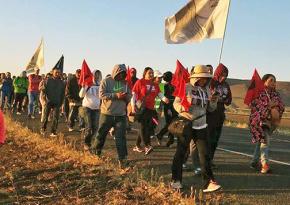A campaign for Sakuma farmworkers
reports from Washington state on a campaign to win farmworker justice.
FOUR YEARS after the initial strikes that launched their union, workers at Sakuma Bros. farms in the Skagit Valley north of Seattle are fighting for their first union contract.
Until they win a contract, they are calling for a boycott of Sakuma Bros. and the Driscoll brand that markets Sakuma berries. To mark the four-year anniversary of the union's formation and to advance their campaign for a new contract, the union is holding a July 11 rally and march to the Sakuma Bros. Farm Processing Plant.
Workers recently reported on a successful tour of the West Coast where they helped double the number of boycott committees. Ramon Torres, the president of the union, as well as Sakuma farmworkers Lazaro Matamoros and Felimon Pineda, addressed a gathering in Seattle on June 20.
The issues that spurred workers to organize their union, Familias Unidas por la Justicia (Families United for Justice), are many and varied: For 12 or more hours of work, workers get no rest breaks. The company charges deposits for their housing. Piece rates often yield less than the Washington State hourly minimum wage of $9.47. Foremen are abusive. The company withholds Social Security contributions from undocumented workers who will never receive benefits. There is no pension plan, so 60- and 70-year-olds must continue with this grueling work. And workers are exposed to at least five dangerous chemicals on the job.

The workers' demands include a minimum wage of $15 per hour, sick leave, job security, respect, a clean workplace and better housing conditions.
The list of businesses and schools honoring the boycott is impressive, and many student organizations, community groups and labor unions have issued statements of solidarity with the Sakuma farmworkers.
Sakuma workers first struck in 2004, but since summer 2013, there have been no fewer than seven strikes. The most recent strike took place on June 10 when more than 100 workers walked out and won an increase in pay from $.24 to $.28 per pound of strawberries picked. The store price of Driscoll's strawberries is at least $3 per pound.
Though there is still no collective bargaining agreement, the organizing has already achieved some gains. Company housing no longer requires a deposit. Sakuma's attempt to replace the mostly indigenous Mexican workers with H2A workers in 2014 was defeated. Strikes in 2013 won reinstatement of terminated worker Federico Lopez, the firing of an abusive supervisor, $6,000 in back pay for young workers, an agreement against retaliation, and a temporary minimum wage of $12 per hour.
The union also won a lawsuit requiring the company to provide rest breaks and back pay for workers who hadn't received them.


